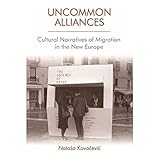Uncommon Alliances : Cultural Narratives of Migration in the New Europe / Nataša Kovačević.
Material type: TextPublisher: Edinburgh : Edinburgh University Press, [2022]Copyright date: ©2018Description: 1 online resource (272 p.)Content type:
TextPublisher: Edinburgh : Edinburgh University Press, [2022]Copyright date: ©2018Description: 1 online resource (272 p.)Content type: - 9781474435888
- 9781474435901
- 809/.933552
- online - DeGruyter
| Item type | Current library | Call number | URL | Status | Notes | Barcode | |
|---|---|---|---|---|---|---|---|
 eBook
eBook
|
Biblioteca "Angelicum" Pont. Univ. S.Tommaso d'Aquino Nuvola online | online - DeGruyter (Browse shelf(Opens below)) | Online access | Not for loan (Accesso limitato) | Accesso per gli utenti autorizzati / Access for authorized users | (dgr)9781474435901 |
Browsing Biblioteca "Angelicum" Pont. Univ. S.Tommaso d'Aquino shelves, Shelving location: Nuvola online Close shelf browser (Hides shelf browser)

|

|

|

|

|

|

|
||
| online - DeGruyter Face-to-Face in Shakespearean Drama : Ethics, Performance, Philosophy / | online - DeGruyter Coastal Cultures of the Long Nineteenth Century / | online - DeGruyter Contributions to Scottish Periodicals / | online - DeGruyter Uncommon Alliances : Cultural Narratives of Migration in the New Europe / | online - DeGruyter Shakespeare in the North : Place, Politics and Performance in England and Scotland / | online - DeGruyter The Edinburgh Companion to Shari'ah Governance in Islamic Finance / | online - DeGruyter Local States in an Imperial World : Identity, Society and Politics in the Early Modern Deccan / |
Frontmatter -- Contents -- Acknowledgements -- Introduction -- 1. Performing the State: Artistic Re-Presentations of European Community -- 2. Alternative Hospitalities on the Margins of Europe -- 3. Colonial Spectres in Europe’s Historiography -- 4. Postcolonial and Postcommunist Contact Zones in a United Europe -- 5. Epilogue: Memories of Yugoslavia and Europe to Come -- Notes -- Bibliography -- Index
restricted access online access with authorization star
http://purl.org/coar/access_right/c_16ec
Examines European Union’s neocolonial sovereignty in cultural narratives of migrationUncommon Alliances: Cultural Narratives of Migration in the New Europe takes a critical stance toward both assimilationist and multicultural imaginings of community in the European Union that occlude neocolonial relations of dependence and exclusion. Bringing into conversation postcolonial and post-communist migration narratives from Africa, Asia and Eastern Europe, it aims to capture the emergent shift from national to postnational European space. Through its examination of cultural texts, including works by Jamal Mahjoub, Mike Phillips, Laila Lalami, Mahi Binebine, Dubravka Ugrešić and others, this book traces EU neocolonial practices in relation to European history, borders and guiding ideals of community, which exclude various 'others' from their symbolic imaginary. The book deliberately moves the discussion away from social-scientific approaches to humanities and offers a fresh intellectual framework for understanding multicultural identity in Europe.Key FeaturesGoes beyond traditional frameworks of cultural analysis (national, ethnic, or language-based) by focusing on narratives which take the European Union as a point of referenceShifts focus from narratives depicting interactions between different cultures to those imagining communities of solidarity based on common economic or historical marginalisation in the European UnionRevises postcolonial theory by arguing that the European Union exemplifies a new, ‘consensual’ regime of colonial governanceOffers poststructuralist readings of migrant narratives to go beyond the more common, multicultural approaches to such narrativesDevelops original perspectives on individual writers (Jamal Mahjoub, Mike Phillips, Laila Lalami, Mahi Binebine, Dubravka Ugrešić, and others)Helps reorient European Union studies, dominated by social sciences, to the humanities side
Mode of access: Internet via World Wide Web.
In English.
Description based on online resource; title from PDF title page (publisher's Web site, viewed 29. Jun 2022)


